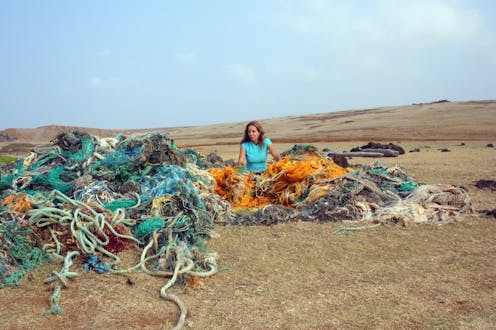My art uses plastic recovered from beaches around the world to understand how our consumer society is transforming the ocean
- Written by Pam Longobardi, Regents' Professor of Art and Design, Georgia State University
 Pam Longobardi amid a giant heap of fishing gear that she and volunteers from the Hawaii Wildlife Fund collected in 2008.David Rothstein, CC BY-ND
Pam Longobardi amid a giant heap of fishing gear that she and volunteers from the Hawaii Wildlife Fund collected in 2008.David Rothstein, CC BY-NDI am obsessed with plastic objects. I harvest them from the ocean for the stories they hold and to mitigate their ability to harm. Each object has the potential to be a message from the sea – a...

